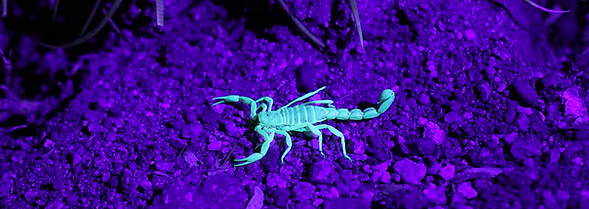
explore the Natural world

Scroll to Learn
Biology
Scorpions aren't actually "bugs" like we might think; they're arachnids, meaning they're more closely related to spiders and ticks! This means that they have eight legs and between one to five pairs of eyes, depending on the species.
The first things you might notice about scorpions are their large tail stinger and pincers. While these might look scary, these tools are used mostly for defense and when hunting. Scorpions will eat insects, spiders, and even small lizards and rodents! Depending on what they prefer to eat, each species has a special venom that is specifically designed to work best against their prey. This is why some scorpions aren't dangerous at all, but others can seriously injure you!
Most scorpions are nocturnal, meaning that they only come out at night, and hide during the day by crawling into tree bark, under rocks, and in burrows. Some species are almost communal, with many individuals sharing a hiding space without fighting. And because they like to hide so much, in developed spaces like cities and towns, they'll usually be found inside of homes, hiding in the walls and under the floors.
While not all scorpions live in the desert, the ones who do have adapted to an environment where water is extremely rare. These species are able to remove harmful compounds like uric acid and others from their bodies without drinking water. They get most of the moisture they need from their food, but special waxes on their cuticle can also trap moisture from the air!

Scorpions glow a bright greenish-cyan color when exposed to ultraviolet (UV) light. This light is made by the sun, and is the same kind of light that can give you a tan when outside!
The reason scorpions do this is not understood yet. However, some experiments have suggested that scorpions might be able to see their own glow when exposed to sunlight [1]. This would let them know if they’re in an open field, and that they should hide before a hungry bird spots them!
In experiments where scorpions have had their eyes covered, they’re much slower to react to the UV light.
Other scientists think that it might be a warning to other animals, showing them the scorpion is dangerous, and that they should stay away.
While it’s still unknown exactly why they glow, scientists have found special molecules inside the scorpion’s cuticle (or shell) that are responsible for this creepy characteristic. Even fossils of scorpions can still glow!
You can use your own special UV flashlight to find scorpions in the dark! But always remember to wear covered boots, do not hold or touch scorpions with your bare hands, never look at or shine the UV light on your skin, and always travel with a buddy!
[1] Gaffin, D. D., Bumm, L. A., Taylor, M. S., Popokina, N. V., & Mann, S. (2012). Scorpion fluorescence and reaction to light. Animal Behaviour, 83(2), 429-436.

